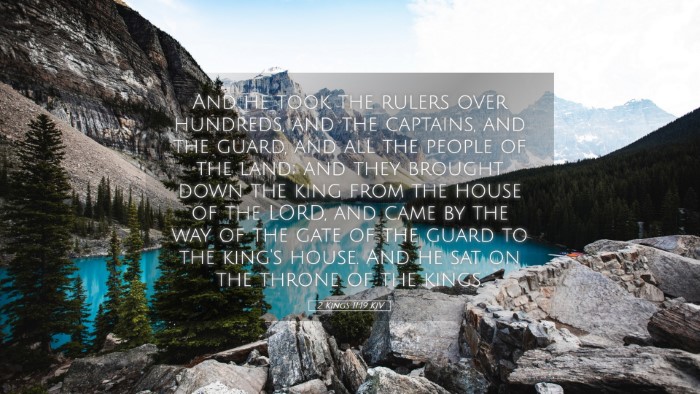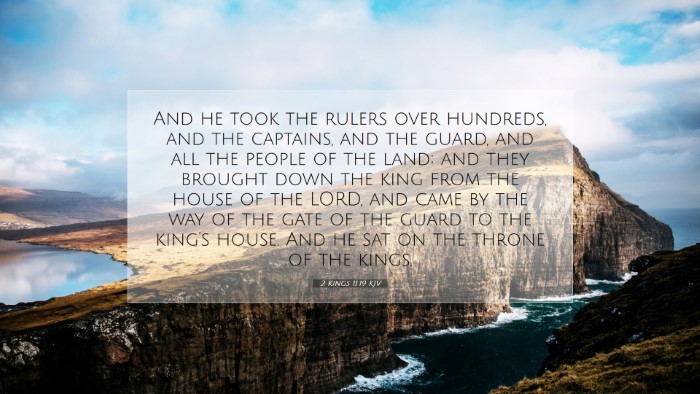Old Testament
Genesis Exodus Leviticus Numbers Deuteronomy Joshua Judges Ruth 1 Samuel 2 Samuel 1 Kings 2 Kings 1 Chronicles 2 Chronicles Ezra Nehemiah Esther Job Psalms Proverbs Ecclesiastes Song of Solomon Isaiah Jeremiah Lamentations Ezekiel Daniel Hosea Joel Amos Obadiah Jonah Micah Nahum Habakkuk Zephaniah Haggai Zechariah Malachi2 Kings 11:19
2 Kings 11:19 KJV
And he took the rulers over hundreds, and the captains, and the guard, and all the people of the land; and they brought down the king from the house of the LORD, and came by the way of the gate of the guard to the king's house. And he sat on the throne of the kings.
2 Kings 11:19 Bible Commentary
Commentary on 2 Kings 11:19
Verse Reference: 2 Kings 11:19 - "And he took the rulers of hundreds, and the captains, and the guard, and all the people of the land; and they brought down the king from the house of the LORD, and came by the way of the gate of the guard to the king's house. And he sat on the throne of the kings."
Overview
This significant verse captures the pivotal moment in Israel's history when Jehoash (Joash) is presented as king. In a broader context, this event follows the usurpation of Athaliah, who had seized power and attempted to destroy the royal line of David. This commentary draws insights from various public domain sources to elucidate the theological and historical implications of this verse.
Historical Context
The events leading up to 2 Kings 11:19 are crucial for understanding the verse. Athaliah's reign was marked by idolatry and oppression. Following her attempts to exterminate the royal lineage by killing all potential heirs, the child Joash was hidden by Jehoiada the priest. His coronation symbolizes not just the restoration of the Davidic line but also a return to Yahwistic worship.
Matthew Henry's Insights
- Restoration of Monarchy: Henry emphasizes that the enthronement of Joash represents God's faithfulness to His covenant with David. By preserving a line for David’s descendants, God demonstrates His sovereignty.
- Role of Jehoiada: Jehoiada’s leadership is highlighted, showing the importance of godly influence in political matters. His organization of the Levites and the army illustrates that spiritual and civic duties are intertwined.
- Public Involvement: The involvement of “the people of the land” indicates a communal recognition of Joash's rightful claim to the throne, which is essential in establishing legitimacy and authority.
Albert Barnes' Commentary
- Transition of Power: Barnes notes that the transfer from a tyrannical rule to a rightful king is critical. The phrase "brought down the king from the house of the LORD" signifies a deliberate act of reinstating divine order.
- Significance of the Throne: Sitting on the throne is not merely a physical act, but it symbolizes the fulfillment of God’s promise. Joash’s coronation under the agency of Jehoiada serves as a divine affirmation of the Davidic covenant.
- Moral Lesson: Barnes points out the moral implications of this transition, suggesting that leaders should be chosen based on fidelity to God’s commands rather than personal ambition.
Adam Clarke's Observations
- Military Support: Clarke remarks on the strategic gathering of military leaders, which ensures that Joash's rise to power is supported not just ceremonially, but with military might, providing stability against potential opposition.
- Religious and Political Alliance: The alliance between Jehoiada and the military commanders demonstrates a cohesive approach to governance, uniting spiritual and military leadership for the nation’s benefit.
- Fulfillment of Prophecy: Clarke emphasizes that this event is a fulfillment of prophetic words, indicating that God's plan for His people and their leaders unfolds through His sovereign will.
Theological Implications
This verse encapsulates various theological themes vital for scholars and theologians:
- Divine Sovereignty: God's providential care over His people, as He safeguards a remnant of the Davidic line amidst chaos.
- Covenant Faithfulness: The Lord's unwavering commitment to His promises is embodied in the preservation and establishment of Joash as king.
- Leadership and Influence: The importance of godly leaders in shaping the spiritual and moral fabric of the nation illustrates the interplay between faith and politics.
- Community Participation: This event serves as a reminder of the collective responsibility of the people to uphold righteousness and support just governance.
Conclusion
2 Kings 11:19 is a pivotal moment that ushers in an era of hope and restoration for Judah. The power of collective action under the guidance of faithful leadership shines through in this narrative. As modern readers and leaders reflect on this passage, it prompts consideration of the ways in which God orchestrates history, the importance of maintaining fidelity to His covenant, and the role of the community in affirming and supporting God’s ordained leaders.


